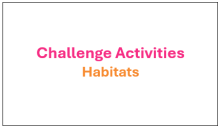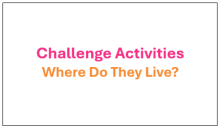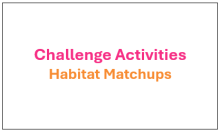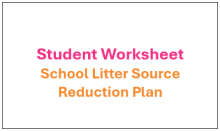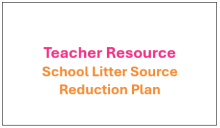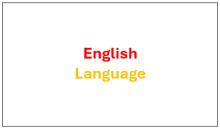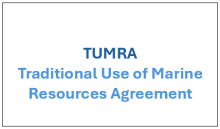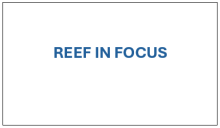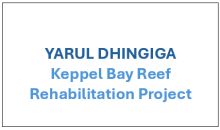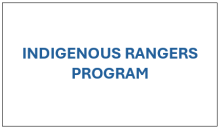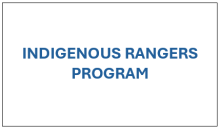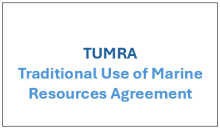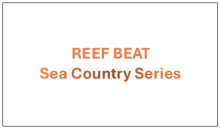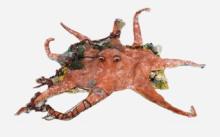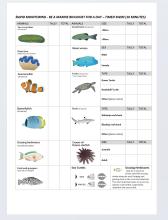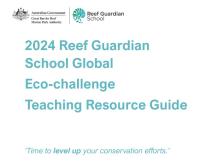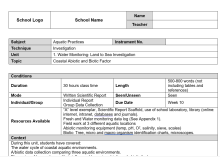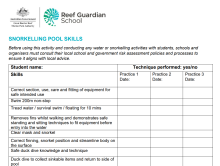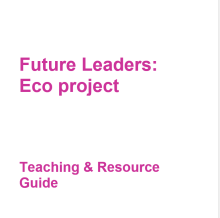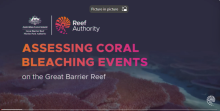- All pages
- Primary school
- Middle school
- Senior school
Primary Grade 1 - Habitats
Coral reef colouring worksheet.
Primary Grade 1 - Where Do They Live?
Cut and Paste Activity on correct habitats for marine sea life?
Primary Grade 1 - Habitat Matchups
1. Match the animal with their habitat by drawing a line between them.
2. Pick one of the habitats above and investigate what other animals may live there.
3. Draw a picture of you chosen habitat and include some of the animals you have found.
Student Worksheet - School Litter Source Reduction Plan
Student Worksheet - School Litter Source Reduction Plan
Teachers Resource - School Litter Source Reduction Plan
This tool may assist Teachers to complete the worksheet.
ACTIVITY Chatterbox - English Language
Unlock the secrets of learning with our Chatterbox Challenge in English Language – where every fold leads to new knowledge!
Pagination
VIDEO - Working with Traditional Owners for Sea Country Management across GBRMPA
Jason discusses tools to provide genuine pathways for Traditional Owner groups to engage in effective co-management of the Great Barrier Reef Marine Parks, both Commonwealth and State, and the Great Barrier Reef World Heritage Area.
This includes Traditional Use of Marine Resources Agreements (TUMRAs) as one tool that describes how Traditional Owners work in partnership with the Australian and Queensland governments to manage traditional use activities on their Sea Country.
Jason’s key message is that maintaining effective and meaningful partnerships with Traditional Owners is essential in protecting cultural and heritage values, conserving biodiversity and enhancing the resilience of the Great Barrier Reef into the future.
VIDEO - Reef in Focus: Managing Sea Country Webinar
In honor of National Reconciliation Week 2022, the Reef Authority held a Reef in Focus webinar, 'Managing Sea Country' on Tuesday 31 May 2022. Learn first-hand from our First Nations partners about their deep connection to the Great Barrier Reef and their expanding role in its management.
VIDEO - Yarul Dhingiga: Keppel Bay Reef Rehabilitation Project
In October 2022, the Reef Joint Field Management Program, the Woppaburra TUMRA Aboriginal Corporation (WTAC) and local tourism operators came together on Woppaburra Country for the third trial of the MARRS (Mars Assisted Reef Restoration System) reef star – hexagonal metal frames that can be placed on the seabed, in areas of loose coral rubble, to provide a stable platform for live coral fragment attachment.
VIDEO - Indigenous Ranger Training on the Reef
We recently brought together a number of Indigenous ranger groups from across the Great Barrier Reef to complete incident management training. Aboriginal and Torres Strait Islander people are the Traditional Owners of the Great Barrier Reef region, and evidence of their sea country connections goes back over 60,000 years.
VIDEO - Indigenous Rangers on the Reef
The Indigenous ranger's program is a nationally accredited training course by the Great Barrier Reef Marine Park Authority. It provides rangers with the skills to ensure Marine Park users comply with its rules and traditional lore.
The Authority understands that having an effective and meaningful partnership with Traditional Owners is essential to protect cultural and heritage values, conserve biodiversity and enhance the resilience of the Reef.
VIDEO - Traditional Use of Marine Resources Agreements
The Marine Park Authority and Traditional Owners are working together to integrate modern marine park management and traditional knowledge to protect this irreplaceable iconic World Heritage Area.
Traditional Use of Marine Resources Agreements are community-based plans for management of traditional resources which are accredited in legislation and have proved a successful mechanism for joint management of the Reef.
Traditional Use of Marine Resources Agreements describe how Great Barrier Reef Traditional Owner groups work in partnership with the Australian and Queensland governments to manage traditional use activities on their sea country.
Pagination
REEF BEAT - Sea Country Series
Posters on a wide variety of topics, including connection to sea country, sustainable use of resources, traditional use, caring and protecting sea country, dance, trade, ceremonies, and cultural sites.
Eco-REEFlection Task
The Reef Guardian School REEFlection task was developed to commemorate the 20 year anniversary of the Reef Guardian School program. Since 2003, more than 300 schools have participated in environmental and sustainability projects and activities within their classrooms, their school grounds and local areas that help protect the Great Barrier Reef. These actions have been central in igniting curiosity and connecting students, teachers, their communities, and local environmental agencies to make positive changes for the marine environment. This fosters and promotes a culture of Reef stewardship.
The REEFlection task is designed to capture your story of connection to the Reef and what it means to you to be a Reef Guardian.
10-Minute Timed Swim Survey - Word version
Be a Marine Biologist for a Day - 10-minute timed swim survey - word version
Teaching Resource Guide
This teaching resource guide has been designed around an inquiry-based model to assist with incorporating the 2024 Eco-challenge within the classroom. Students learn key STEAM and life skills through inquiry-based learning, and we hope this resource compliments your teaching. We have provided subject specific Australian curriculum codes (ACARA 9.0) and have provided ways to adapt this to international curriculum outcomes at the end of this document. We have also aligned this eco-challenge to 9 of the UN global sustainable development goals.
Water Quality Investigation
During this unit, students will cover: The water cycle of coastal aquatic environments, A/biotic data collection comparing three aquatic environments, discussion of how water quality is influenced by various biotic and abiotic factors, identification of a/biotic influences on environmental conditions and impacts to the three environments.
Snorkeling Pool Skills Assessment
Use this snorkeling skills assessment to assess the competency of students prior to conducting aquatic practices.
Pagination
10-Minute Timed Swim Survey - Word version
Be a Marine Biologist for a Day - 10-minute timed swim survey - word version
Teaching Resource Guide
This teaching resource guide has been designed around an inquiry-based model to assist with incorporating the 2024 Eco-challenge within the classroom. Students learn key STEAM and life skills through inquiry-based learning, and we hope this resource compliments your teaching. We have provided subject specific Australian curriculum codes (ACARA 9.0) and have provided ways to adapt this to international curriculum outcomes at the end of this document. We have also aligned this eco-challenge to 9 of the UN global sustainable development goals.
Water Quality Investigation
During this unit, students will cover: The water cycle of coastal aquatic environments, A/biotic data collection comparing three aquatic environments, discussion of how water quality is influenced by various biotic and abiotic factors, identification of a/biotic influences on environmental conditions and impacts to the three environments.
Snorkeling Pool Skills Assessment
Use this snorkeling skills assessment to assess the competency of students prior to conducting aquatic practices.
Future Leaders: Eco Project
This Eco Project has been designed for students to explore the current and future issues facing the Great Barrier Reef through the lens of a future STEAM-focused role.
The aim of the project is for students to select a future job profile and showcase how they could apply their future skillset towards managing and protecting the health and longevity of the Reef.
Assessing coral bleaching events on the Great Barrier Reef
Discover how the Reef Authority, together with our science and management partners, assess the extent, severity and prevalence of coral bleaching events on the Great Barrier Reef. From outer space to underwater, you will see the complex monitoring and reporting that happens before, during and after a coral bleaching event.

